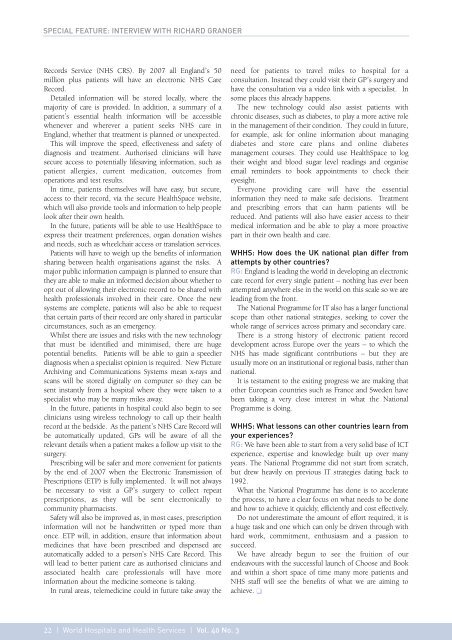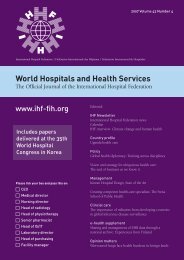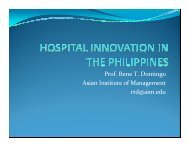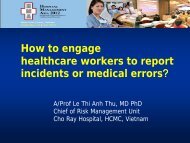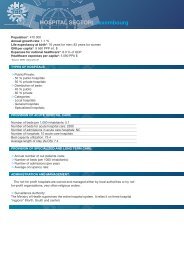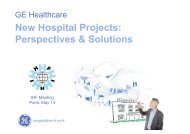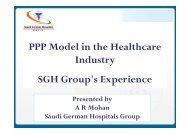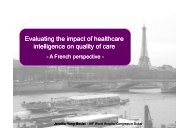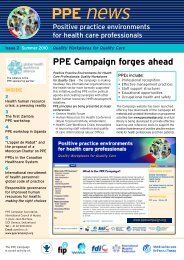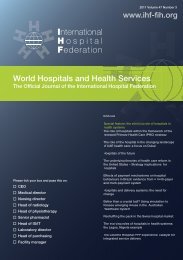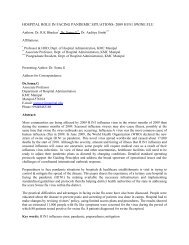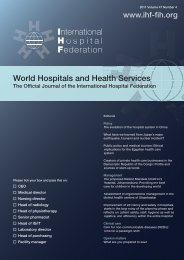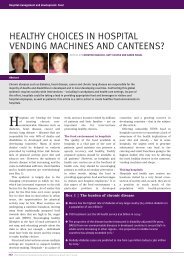World Hospitals and Health Services - International Hospital ...
World Hospitals and Health Services - International Hospital ...
World Hospitals and Health Services - International Hospital ...
You also want an ePaper? Increase the reach of your titles
YUMPU automatically turns print PDFs into web optimized ePapers that Google loves.
SPECIAL FEATURE: INTERVIEW WITH RICHARD GRANGER<br />
Records Service (NHS CRS). By 2007 all Engl<strong>and</strong>’s 50<br />
million plus patients will have an electronic NHS Care<br />
Record.<br />
Detailed information will be stored locally, where the<br />
majority of care is provided. In addition, a summary of a<br />
patient’s essential health information will be accessible<br />
whenever <strong>and</strong> wherever a patient seeks NHS care in<br />
Engl<strong>and</strong>, whether that treatment is planned or unexpected.<br />
This will improve the speed, effectiveness <strong>and</strong> safety of<br />
diagnosis <strong>and</strong> treatment. Authorised clinicians will have<br />
secure access to potentially lifesaving information, such as<br />
patient allergies, current medication, outcomes from<br />
operations <strong>and</strong> test results.<br />
In time, patients themselves will have easy, but secure,<br />
access to their record, via the secure <strong>Health</strong>Space website,<br />
which will also provide tools <strong>and</strong> information to help people<br />
look after their own health.<br />
In the future, patients will be able to use <strong>Health</strong>Space to<br />
express their treatment preferences, organ donation wishes<br />
<strong>and</strong> needs, such as wheelchair access or translation services.<br />
Patients will have to weigh up the benefits of information<br />
sharing between health organisations against the risks. A<br />
major public information campaign is planned to ensure that<br />
they are able to make an informed decision about whether to<br />
opt out of allowing their electronic record to be shared with<br />
health professionals involved in their care. Once the new<br />
systems are complete, patients will also be able to request<br />
that certain parts of their record are only shared in particular<br />
circumstances, such as an emergency.<br />
Whilst there are issues <strong>and</strong> risks with the new technology<br />
that must be identified <strong>and</strong> minimised, there are huge<br />
potential benefits. Patients will be able to gain a speedier<br />
diagnosis when a specialist opinion is required. New Picture<br />
Archiving <strong>and</strong> Communications Systems mean x-rays <strong>and</strong><br />
scans will be stored digitally on computer so they can be<br />
sent instantly from a hospital where they were taken to a<br />
specialist who may be many miles away.<br />
In the future, patients in hospital could also begin to see<br />
clinicians using wireless technology to call up their health<br />
record at the bedside. As the patient’s NHS Care Record will<br />
be automatically updated, GPs will be aware of all the<br />
relevant details when a patient makes a follow up visit to the<br />
surgery.<br />
Prescribing will be safer <strong>and</strong> more convenient for patients<br />
by the end of 2007 when the Electronic Transmission of<br />
Prescriptions (ETP) is fully implemented. It will not always<br />
be necessary to visit a GP’s surgery to collect repeat<br />
prescriptions, as they will be sent electronically to<br />
community pharmacists.<br />
Safety will also be improved as, in most cases, prescription<br />
information will not be h<strong>and</strong>written or typed more than<br />
once. ETP will, in addition, ensure that information about<br />
medicines that have been prescribed <strong>and</strong> dispensed are<br />
automatically added to a person’s NHS Care Record. This<br />
will lead to better patient care as authorised clinicians <strong>and</strong><br />
associated health care professionals will have more<br />
information about the medicine someone is taking.<br />
In rural areas, telemedicine could in future take away the<br />
need for patients to travel miles to hospital for a<br />
consultation. Instead they could visit their GP’s surgery <strong>and</strong><br />
have the consultation via a video link with a specialist. In<br />
some places this already happens.<br />
The new technology could also assist patients with<br />
chronic diseases, such as diabetes, to play a more active role<br />
in the management of their condition. They could in future,<br />
for example, ask for online information about managing<br />
diabetes <strong>and</strong> store care plans <strong>and</strong> online diabetes<br />
management courses. They could use <strong>Health</strong>Space to log<br />
their weight <strong>and</strong> blood sugar level readings <strong>and</strong> organise<br />
email reminders to book appointments to check their<br />
eyesight.<br />
Everyone providing care will have the essential<br />
information they need to make safe decisions. Treatment<br />
<strong>and</strong> prescribing errors that can harm patients will be<br />
reduced. And patients will also have easier access to their<br />
medical information <strong>and</strong> be able to play a more proactive<br />
part in their own health <strong>and</strong> care.<br />
WHHS: How does the UK national plan differ from<br />
attempts by other countries?<br />
RG: Engl<strong>and</strong> is leading the world in developing an electronic<br />
care record for every single patient – nothing has ever been<br />
attempted anywhere else in the world on this scale so we are<br />
leading from the front.<br />
The National Programme for IT also has a larger functional<br />
scope than other national strategies, seeking to cover the<br />
whole range of services across primary <strong>and</strong> secondary care.<br />
There is a strong history of electronic patient record<br />
development across Europe over the years – to which the<br />
NHS has made significant contributions – but they are<br />
usually more on an institutional or regional basis, rather than<br />
national.<br />
It is testament to the exiting progress we are making that<br />
other European countries such as France <strong>and</strong> Sweden have<br />
been taking a very close interest in what the National<br />
Programme is doing.<br />
WHHS: What lessons can other countries learn from<br />
your experiences?<br />
RG: We have been able to start from a very solid base of ICT<br />
experience, expertise <strong>and</strong> knowledge built up over many<br />
years. The National Programme did not start from scratch,<br />
but drew heavily on previous IT strategies dating back to<br />
1992.<br />
What the National Programme has done is to accelerate<br />
the process, to have a clear focus on what needs to be done<br />
<strong>and</strong> how to achieve it quickly, efficiently <strong>and</strong> cost effectively.<br />
Do not underestimate the amount of effort required, it is<br />
a huge task <strong>and</strong> one which can only be driven through with<br />
hard work, commitment, enthusiasm <strong>and</strong> a passion to<br />
succeed.<br />
We have already begun to see the fruition of our<br />
endeavours with the successful launch of Choose <strong>and</strong> Book<br />
<strong>and</strong> within a short space of time many more patients <strong>and</strong><br />
NHS staff will see the benefits of what we are aiming to<br />
achieve. ❑<br />
22 | <strong>World</strong> <strong><strong>Hospital</strong>s</strong> <strong>and</strong> <strong>Health</strong> <strong>Services</strong> | Vol. 40 No. 3


